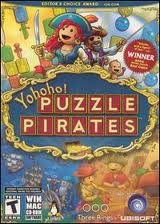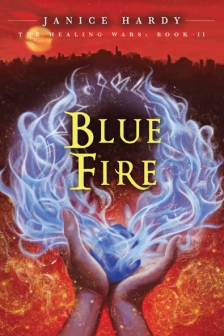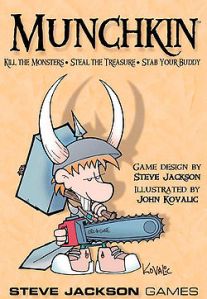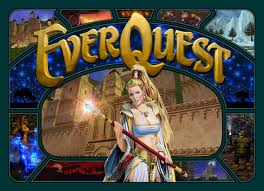Amie Rose Rotruck is the author of Bronze Dragon Codex, one of the titles in Wizards of the Coast’s Dragon Codices series. Her latest book, How to Trap a Zombie, Track a Vampire and Other Hands-on Activities for Monster Hunters, was also published by WotC and is now available. I got the chance to ask her some questions about her writing and gaming experiences, what’s she’s up to now, and what she enjoys doing these days. Hope you enjoy it.
For more information about the author, please checkout her website.
* * *
I must admit, How to Trap a Zombie, Track a Vampire and Other Hands-on Activities for Monster Hunters is one of the coolest and most original ideas I’ve seen for a children’s book in a long time. Would you mind describing what the book is about, how you came up with the concept for it, and how it ended up at Wizards of the Coast?
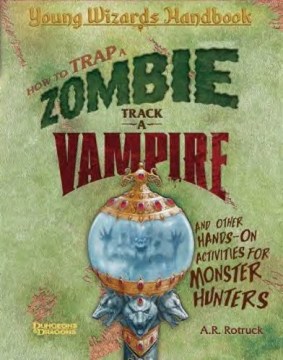 I wish I could take credit for coming up with the concept, but alas, I can’t. I was approached by Nina Hess, an editor at Mirrorstone, about doing a book that would be The Dangerous Book for Boys meets Dragonology. I’d worked with Mirrorstone before on Bronze Dragon Codex and they thought I might be a good fit for this new book. I was absolutely over the moon about coming up with a proposal for the book, as I’m both a fantasy fan and craft addict. I thought of the book as a scouting guide for wizards and dug out my old Girl Scout Manual, as well as numerous craft books and The Dangerous book series. I sent in a proposal, which was accepted, and then I started writing it.
I wish I could take credit for coming up with the concept, but alas, I can’t. I was approached by Nina Hess, an editor at Mirrorstone, about doing a book that would be The Dangerous Book for Boys meets Dragonology. I’d worked with Mirrorstone before on Bronze Dragon Codex and they thought I might be a good fit for this new book. I was absolutely over the moon about coming up with a proposal for the book, as I’m both a fantasy fan and craft addict. I thought of the book as a scouting guide for wizards and dug out my old Girl Scout Manual, as well as numerous craft books and The Dangerous book series. I sent in a proposal, which was accepted, and then I started writing it.
YWH ended up being a field guide to monsters with activities, games, and recipes that related to the monsters described in each chapter. There were also items about things that a monster-hunter would need to know, such as how to make a shelter or a lantern. I also threw some D&D basics in there, such as how to make a map and what type of people you want in your monster-hunting party.
Who did you have in mind when writing the book?
Myself at age 11. I would have LOVED a book when I was a kid. I was always going out in the woods behind my house and playing fantasy games in my head and I liked making things for my adventures, such as carrying pouches and wands. I would have loved a book that talked about making supplies for a fantasy world, but I had to content myself with some scout guides and books on colonial and Native American crafts. I hope that this book will reach young fantasy fans who enjoy pretending outside as well as indoors.
The book has a definite RPG vibe to it. How intentional was that?
I didn’t set out to have RPG tips in it, but I found that writing it as a scouting guide for a wizard naturally lent itself to that. For example, mapmaking is a skill that scouts learn in this world, so it made sense that wizards would need to know it too. From there it was a short leap to tweak the mapmaking section to easily translate to RPGs. It was a nice bonus and fit what Mirrorstone wanted with the book anyway.
You also “assisted” R.D. Henham in writing Bronze Dragon Codex. Would you mind talking a little bit about this book as well?
 Bronze Dragon Codex is set in the Dragonlance world of Krynn. After I sent a writing sample to Mirrorstone, they asked me to come up with a proposal for a dragon-centric book from one of the characters from the Dragonlance: the New Adventures Series. I found Tatelyn, a girl in Dragonspell by Jeff Sampson. Her brother was killed by a zombie copper dragon that was raised by an evil sorceress. Since Tatelyn was so young at the time, I thought she could end up having a deep prejudice against all dragons, including the good metallic dragons. It was a short leap to pair her with a dragon who hated humans and see what would happen when they were forced to work together.
Bronze Dragon Codex is set in the Dragonlance world of Krynn. After I sent a writing sample to Mirrorstone, they asked me to come up with a proposal for a dragon-centric book from one of the characters from the Dragonlance: the New Adventures Series. I found Tatelyn, a girl in Dragonspell by Jeff Sampson. Her brother was killed by a zombie copper dragon that was raised by an evil sorceress. Since Tatelyn was so young at the time, I thought she could end up having a deep prejudice against all dragons, including the good metallic dragons. It was a short leap to pair her with a dragon who hated humans and see what would happen when they were forced to work together.
R.D. Henham takes the credit for the Dragon Codex books, but in reality they are written by the assistant scribes. It’s a fun job, even though the workplace is drafty and overrun with evil dragons these days.
You’ve mentioned that you were voted most likely to be eaten by a dragon in high school. Would you care to explain this?
I’ve been a dragon lover for a very long time, always reading and writing about them, and my classmates knew it. My school had some rather off-the-wall “most likelys” (one of my best friends was voted “most likely to adopt a British accent”), but I think mine was the absolute best and most fitting. I thought for sure that this would come true when researching Bronze Dragon Codex, but fortunately I’m still here.
Were you a big reader as a child? What were some of your favorite books and/or authors growing up?
Very much so. I was a big fantasy fan, of course. Lloyd Alexander’s Chronicles of Prydain was my favorite series, and Peter Beagle’s The Last Unicorn remains to this day my favorite book of all time. I also liked Susan Cooper’s The Dark is Rising, the Narnia books, A Wrinkle in Time and the sequels. I was out of college by the time Harry Potter arrived on the scene, but I know I would have loved those too; I certainly love them as an adult! I also was fond of what my one friend calls “little farm girl stories,” like the Little House and Anne of Green Gables books and I’m currently re-reading The Witch of Blackbird Pond, another favorite. I also was a fan of the Dragonlance books, so I’m very thrilled that I broke into the publishing world by writing one of them!
I’ve heard you’re a pretty slow reader. How long does it generally take you to finish an average length novel?
Hee, very funny. I’m actually quite a fast reader, which I assume you gleaned from my website. My claim to fame is reading the final Harry Potter book in a 2.5 hours (12:30 – 3 AM the day it was released). If I can read straight through, I can read a YA fantasy novel (I don’t often read adult novels) such as Libba Bray’s A Great and Terrible Beauty or Cassandra Clare’s Mortal Instruments books in 2-4 hours. It usually takes me longer, though, as these days I only read a bit before I go to sleep. I also usually am reading at least three books at a time, so I’ll read a chapter or two of one, then switch to another.
Are you or have you ever been a gamer? What has your gaming experience been like (board games, pen & paper RPGs, console & computer games, etc.)?
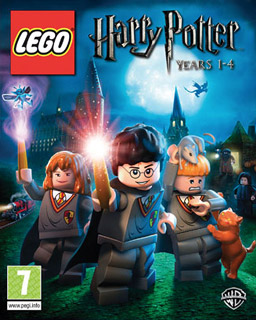 I’m a gamer dabbler. I’ve played some pen and paper RPGs over the years, and always enjoy a good board game, but months can go by without me gaming. Best RPG experiences I had were a few years ago when I’d get together with friends from two states and we’d spend the whole weekend gaming. Schedules unfortunately started getting in the way, so we’ve only been doing shorter and less complicated games lately.
I’m a gamer dabbler. I’ve played some pen and paper RPGs over the years, and always enjoy a good board game, but months can go by without me gaming. Best RPG experiences I had were a few years ago when I’d get together with friends from two states and we’d spend the whole weekend gaming. Schedules unfortunately started getting in the way, so we’ve only been doing shorter and less complicated games lately.
I also like computer games, but I tend to like the simpler ones, such as the Lego Harry Potter and Indiana Jones games. My coordination is horrible, so I’m not a fan of games that require quick reflexes. I like watching them when people play, though, because some of the storylines are quite fascinating.
Have you ever ventured into online worlds?
Never been, actually, unless you count Frontierville on Facebook. I spend so much time working on computer between regular work (I’m an electrical engineer in my other job) and writing that I try to stay away from the computer for recreation.
Would you say your gaming experience has had any effect on you as a writer?
I think any writer, especially fantasy writers, would benefit from gaming. It forces you to think through a story in mundane terms that are easy to overlook, such as how long it takes to get from point A to point B on an adventure. There’s also some acting involved in RPGs, and I think some acting experience, specifically improv, is also beneficial. It teaches you how to get inside a story rather than hovering over it. In my case, gaming also really helped because I ended up writing two books that were aimed at a gaming crowd and it was good to know the market.
Would you say there is grind involved in the writing process?
I wouldn’t call it a grind, because I enjoy it, but I do a lot of scheduling when I’m involved in a project, especially ones with deadlines like Bronze and YWH. I start with the dates by which I’m supposed to deliver a project, and figure out how much I need to write every day to get a finished draft, and then have time to revise it. I love making spreadsheets so I can track my writing process.
When I’m working on other stories that I hope to market upon completion, I try to do the same thing, but it’s harder to keep at it. I’m a BIG fan of deadlines; for some reason they spark creativity!
By contrast, what would you say is one of the most rewarding things about being a writer?
The “ah ha!” moments. I LOVE working with a plot and then something just clicking into place. Finding the plot for Bronze when I met Tatelyn, for example, was an “ah ha!” moment. There were also plenty as I worked on different monsters and tried to find just the right activity to pair with each monster. Recently a friend suggested that I change the main character of a book I’m working on to male, as there aren’t many male protagonists in YA fantasy. I went with it, not because I wanted to make the book more marketable (although that would be a nice bonus!), but because it fit the story so much better that I was having “ah ha!” moments all over the place. That’s my latest writing project; changing the gender of my main character as I revise that story.
When do you find time to write?
Right now I’m trying to figure that out. My daughter was born about a week before Young Wizards Handbook came out and since then it’s been difficult to find writing time; been difficult just to figure out regular work time! But I’m starting to get back to it, I usually prefer having a bit of time after my husband gets home and can watch her to write before dinner. Sometimes I’m able to manage some writing time if she’s asleep, but that’s usually taken up with other, less fun chores.
BEFORE my daughter, I would try to write every day if I was immersed in a project. The key was in some advice I heard Stephen King give once: never a day without a line. If you just write one line a day, that keeps your mind in the story. Last year I was shooting for a page a day. Didn’t always get it in, but I did get a rough draft of a book finished between February and August.
How do you tend to escape these days?
Reading, of course. I love re-reading old favorites like the books I mentioned above, plus I’ve been reading Carrie Jones, Lisa Manchev, Maggie Stiefvater and all the wonderful YA fantasy that’s out there these days. Most recent book I bought that I’m reading is Carrie Ryan’s “The Dark and Hollow Places.” I’m also reading a lot of picture books to my daughter, which is so much fun!
I’m also a fan of crafts; I love crocheting mainly because it’s easy to do in front of the TV (another form of escape; but I find it difficult to just watch and do nothing). TV’s another good escape, especially because there’s so much good fantasy out there now. My current favorites are True Blood, Supernatural, both the British and US Being Human, and I’m really looking forward to Game of Thrones. I also like good action/crime/dramas like Boardwalk Empire, Sons of Anarchy, Castle, Justified and Dexter. Survivor and anything with Gordon Ramsay are my guilty pleasures.
Would you have any words of advice for the would-be-writers out there?
Read. Read a lot. Write. Write a lot. Try to write every day if you can, if only a sentence or two. Play. Don’t feel guilty about hobbies other than writing, you never know when they’ll turn into research for a book.
Is there anything else you’d like to share with this gamer/reader audience?
Keep playing and imagining. Outdoors is probably better for your physically, but both are excellent for you mentally. Just have fun with it and don’t take it too seriously. If your DM suddenly throws a blue knitted hat with snowflakes on it on the table, grab it and put it on, both in real life and in the game (this actually happened in a game my husband was DM-ing. Turned out to be a hat that could talk to the wearer and ended up being the funniest plot I ever ran across in a game).
And last but not least, when was the last time you rolled a twenty-sided die?
Last summer, before baby was born. Been far too long. 😦 I found a pattern for a crocheted twenty-sided die so when I get around to making that, that’ll probably be the next time I roll one!
Thank you, Amie. Enjoy your little one and best of luck on your future writing endevors.






